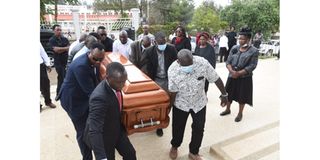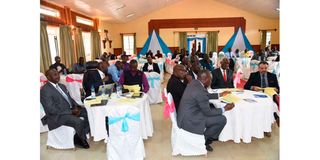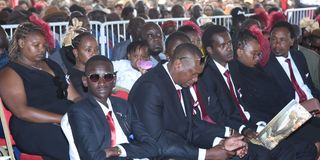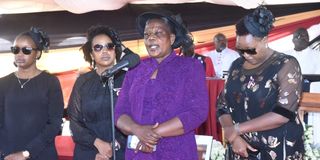Mzee Kibor: The misunderstood 'mens conference chairman'

Mourners carry a casket bearing the body of the late Mzee Jackson Kibor on arrival at Africa Inland Church Fellowship in Eldoret town for a service on March 31, 2022. Burial is on Friday.
He was a colossus in life, drawing admiration and criticism in equal measure due to his controversial nature.
But in death, Mzee Jackson Kibor’s soft underbelly was exposed as family and friends, including politicians who gathered in his Samitui farm, Uasin Gishu County on Friday for his burial narrated tales of how his controversies were misconstrued.
Mzee Kibor, famously referred to as the men’s conference chairman by his Kenyan fans died aged 88 on March 16, at St Luke’s Orthopedic and Trauma Hospital in Eldoret where he had been admitted for ten days over Covid-19 related complications.
Men’s conference national secretary Mr James Mark eulogized their chairman as an extraordinary man.
“Let all men stand and bid goodbye to our chairman Mzee Kibor. The conference was there because of him and the last meeting we held at his home in his honor because he was ailing. As men, we have lost an astute chairman and we are celebrating his life,” he said.

Participants at the first Eldoret City Men Only Congress held at Nobel Hotel in Eldoret town, Uasin Gishu County on October 21, 2019.
According to the family, the much publicized divorce of his second and third wives, Ms Josephine Jepkoech and Ms Naomi Jeptoo, respectively, was just drama because Mzee Kibor wanted to show his family who the boss was.
The family would nickname him ‘waka’ to mean his fiery, disciplinarian and no-nonsense nature.
And his jolly and comical mannerisms followed him to the funeral ceremony as speakers recalled anecdotes which characterized his family, breaking the ribs of mourners in laughter.
His youngest wife, Ms Eunita Chelimo, moved mourners in rapturous laughter when she narrated how Mzee Kibor approached her asking her to be her daughter in-law.
“It is interesting how I became his youngest wife because he disguised his interest. The first time he talked to me, he said he wanted me to be one his son’s wife. But one day he changed his words and said he is seeking my hand in marriage, which I refused. I feared his overtures because I was a youth church leader,” she said.

Uasin Gishu Governor Jackson Mandago. He has condemned attacked on Azimio flagbearer Raila Odinga at the burial of Mzee Jackson Kibor.
Apparently, her parents were squatters at Mzee Kibor estate and her industriousness attracted him to her.
“One day he bought me a phone saying we need to be in constant communication. Later he gave me his briefcase to keep and never came for it only later to tell me it was a security to ensure I do not run away from him,” she narrated.
She said her husband was a loving person who no one in the family would outwit.
“He was the lion and when he roared, all submitted. We even took several strokes of the cane,” she said, describing him as a very loving person and caring person.

Mzee Jackson Kibor's daughter Loise Kibor addressing mourners during her father's burial in Samitui Farm, Uasin Gishu County on April 1, 2022.
“All the drama in the media was just theatrics because in real life it never happened,” she recalled.
Mzee Kibor’s second wife Ms Jeptoo also amused the congregation when she recalled the day he divorced her.
“When asked why he divorced me, he would deny it retorting and questioning why I was still living in his house if he had divorced me. It was only a form of discipline, he would say,” she said.
Ms Jeptoo said her husband was ‘a Mr Fix it,’ since he managed his resources well, and even taught all his wives how to drive lorries and tractors.
“He wanted all things done the way he saw it fit. If you failed, he was there to show you how to do it,” he said.
His eldest son Mr Philip Kimutai said his father would drag them to court if any family member deviated from his rules.
“He was his own lawyer and he never lost a case. Whenever he won, he would come back and make the one he had an issue with know he was right,” he said.

Mourners attebd the burial of Mzee Jackson Kibor at his home in Samitui farm, Kabenes of Uasin Gishu County on April 1, 2022.
Mr Kimutai said his family was united by Mzee Kibor who in February, just before he was taken ill, had gathered all the family members and spelled out how is wealth should be inherited, because he wanted unity.
Ms Loyse Kibor one of his daughters, said her father never wanted to be outwitted and had soft spot for girls.
“We would run away as girls from being punished. He loved all his family members, despite being polygamous and ensured all his children got a good education. He gave us equal attention, despite the fact that we were almost 27 children,” she said.
Another daughter, Ms Evelyn Jerono said her father had left a rich legacy which will stand for generations.
Retired AIC presiding Bishop Silas Yego who led the sermon also amused the mourners as he narrated how he was requested three times to go and baptize Mzee Kibor.
“I was hesitant to baptize him because of his controversial nature. There was a time I saw in the newspapers about him divorcing his two wives but when I asked him he responded that there was nothing like that since all his wives were at home,” recounted the cleric.
“Mzee Kibor had made peace with his family members, including his two wives whom he had divorced. And I saw no need of not baptizing him since he was had confessed his sins and accepted Christ as his personal savior,” said the Bishop.

Mzee Jackson Kibor's widow Naomi Cheptoo (second right) addressing mourners. she is accompanied by her daughters.
“His humility moved me despite owning a vast estate. He donated plots to build churches and school in his parcels of land in Uasin Gishu and Trans Nzoia Counties,” he said.
Lawyer Katwa Kigen also caused laughter when he recalled how Mzee Kibor at one time told him there was need to amend the Biblical Ten Commandments.
“Even if he would hire, fire and rehire me during court sessions, his hard work was outstanding. He hated poverty so much that he said there should be an 11th commandment to punish lazy people,” said Mr Kigen.
He said Mzee Kibor was always disturbed when he saw able people living in poverty.
Mzee Kibor rose from abject poverty to own over 4,000 acres of land and other properties across the country.
Uasin Gishu Governor Jackson Mandago led MPs Caleb Kositany (Soy), Oscar Sudi (Kapseret), Didmus Barasa (Kimilili), Janet Sitienei (Turbo), Alfred Keter (Nandi Hill), Uasin Gishu Woman rep Gladys Shollei, and area Deputy Governor Daniel Chemno, former Education Minister Henry Koskei, among others in eulogizing Mzee Kibor and they called on the family to remain united.
Mr Mandago read Deputy President Dr William Ruto who described Mzee Kibor as an industrious, no-nonsense and a virtuous man who contributed immensely to the well-being of the community.





